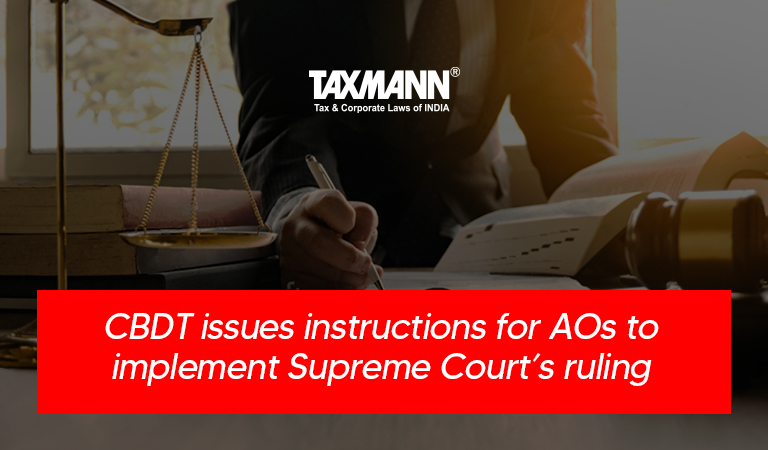CBDT issues instructions for AOs to implement Supreme Court’s ruling
- Blog|News|Income Tax|
- 3 Min Read
- By Taxmann
- |
- Last Updated on 14 May, 2022

Instruction No. 01/2022, dated 11-05-2022
The Supreme Court of India in the case of Ashish Agarwal [2022] 138 taxmann.com 64 (SC) has adjudicated the validity of the reassessment notices issued by the Assessing Officers during the period 01-04-2021 to 30-06-2021 under the old provisions.
The Supreme Court held that the reassessment notices issued under old provisions shall be deemed as show-cause notices issued under new provisions of Section 148A. It also directed AO to follow the new procedure of reassessment with respect to such notices and complete the proceedings accordingly.
To implement the judgment of the Supreme Court uniformly, the Central Board of Direct Taxes (CBDT) has an instruction that may be taken into consideration while implementing the ruling.
The board has clarified that the judgment applies to all cases where extended reassessment notices have been issued irrespective of the fact whether such notices have been challenged or not.
Further, the ruling of the Supreme Court read with the time extension provided by the Taxation and Other Laws (Relaxation and Amendment of Certain Provisions) Act, 2020 (TOLA) will allow extended reassessment notices to travel back in time to their original date when such notices were to be issued and then new section 149 is to be applied at that point.
1. Assessment Years for which reassessment proceedings can be initiated pursuant to SC ruling
a) Assessment Years 2013-14, 2014-15, and 2015-16
Fresh notice under section 148 can be issued with the approval of the specified authority, only if the case falls under section 149(1)(b). This means notices can be issued for these Assessment Years if the income escaped assessment amount is Rs. 50 lakh or more.
b) Assessment Years 2016-17 and 2017-18
Fresh notice under section 148 can be issued with the approval of the specified authority under section 149(1)(a) since they are within the period of three years from the end of the relevant assessment year.
2. Disposing cases not falling within the period of limitation
Notices cannot be issued in a case for AY 2013-14, AY 2014-15, and AY 2015-16 if the income escaping assessment amount is less than Rs. 50 lakh. Thus, the board shall issue a separate instruction prescribing the procedure to dispose of notices issued under old provisions under these cases.
3. Procedure to be followed by AOs to comply with the Supreme Court judgment
The board has specified the AO is required to follow the following procedure to comply with the order of the Hon’ble Supreme Court:
a) AO shall provide the information and material relied upon by him for the issuance of extended reassessment notices by 02-06-2022. The assessee has two weeks to reply as to why a notice under section 148 of the Act should not be issued.
b) If the assessee makes a request seeking more time to file a reply to the show-cause notice, then such a request shall be considered by AO on merit.
c) After receiving the reply, AO shall decide based on material available on record including the reply of the assessee, whether or not it is a fit case to issue a notice under section 148.
d) If it is a fit case to issue a notice under section 148, AO shall serve on the assessee a notice under section 148 after obtaining the approval of the specified authority under section 151 of the new law.
e) If it is not a fit case to issue a notice under section 148 of the Act, the order passed under section 148A(d) to that effect shall be served on the assessee.
Click Here To Read The Complete Instruction
Disclaimer: The content/information published on the website is only for general information of the user and shall not be construed as legal advice. While the Taxmann has exercised reasonable efforts to ensure the veracity of information/content published, Taxmann shall be under no liability in any manner whatsoever for incorrect information, if any.

Taxmann Publications has a dedicated in-house Research & Editorial Team. This team consists of a team of Chartered Accountants, Company Secretaries, and Lawyers. This team works under the guidance and supervision of editor-in-chief Mr Rakesh Bhargava.
The Research and Editorial Team is responsible for developing reliable and accurate content for the readers. The team follows the six-sigma approach to achieve the benchmark of zero error in its publications and research platforms. The team ensures that the following publication guidelines are thoroughly followed while developing the content:
- The statutory material is obtained only from the authorized and reliable sources
- All the latest developments in the judicial and legislative fields are covered
- Prepare the analytical write-ups on current, controversial, and important issues to help the readers to understand the concept and its implications
- Every content published by Taxmann is complete, accurate and lucid
- All evidence-based statements are supported with proper reference to Section, Circular No., Notification No. or citations
- The golden rules of grammar, style and consistency are thoroughly followed
- Font and size that’s easy to read and remain consistent across all imprint and digital publications are applied



 CA | CS | CMA
CA | CS | CMA
